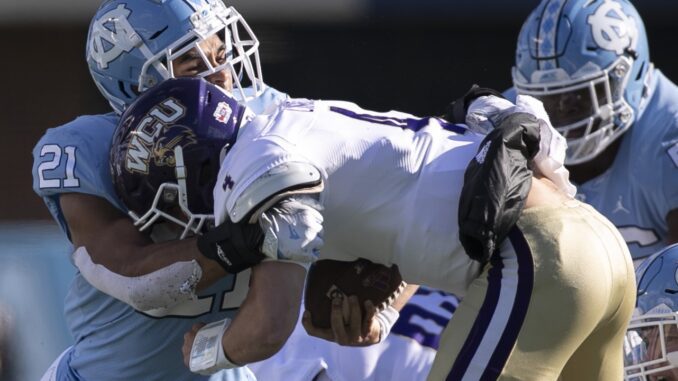
Sam Washington played in the NFL and has spent more than three decades in college coaching, so the concept of spring football is hardly new to him.
This spring, however, is unlike any other he’s ever experienced.
Instead of concentrating on long-range goals such as fundamentals and conditioning with his NC A&T Aggies for a traditional season this fall, Washington is feverishly working to prepare his team to play actual games starting later this month.
“It’s different,” Washington said. “Generally speaking, this time of year you’re working on development. To switch it from development to playing is challenging, more so because football players are routine people who normally do the same thing, in the same way, every day. And we’re totally out of their comfort zone.
“There’s just a lot of little things that have taken us totally out of our routine that makes it very challenging.”
The Aggies are among a large group of FCS and Division II schools around the state that are getting ready to play an abbreviated schedule this spring to make up for a 2020 season lost to the coronavirus pandemic.
Teams will play between 4-6 games with a 16-team national championship playoff in both divisions set to begin in mid-April.
COVID-19 willing.
Among the other state FCS schools playing this spring are Davidson, Elon, Gardner-Webb and Western Carolina. Barton, Catawba, Lenoir-Rhyne, Mars Hill, UNC Pembroke and Wingate are the Division II participants.
While A&T’s Washington and most of his fellow coaches are busy trying to figure out how to negotiate their way through these unprecedented circumstances, at least one has an idea of what to expect. Western Carolina’s Mark Speir got a sneak preview of his Catamounts during the fall by scheduling three games against FBS competition.
Although they lost all three by lopsided margins — to Liberty, Eastern Kentucky and North Carolina — the opportunity to get out onto the field and play was more important than the results, as far as Speir is concerned.
“We learned a lot about externals, the logistics, a lot about our football team,” Speir said. “I know some people are a little anxious about what spring will be, but I think playing those three games in the fall really gave us a comfort zone and we’re really excited about this opportunity.”
In addition to learning how to handle the challenges associated with COVID-19 and the protocols it has brought about, Speir and his staff were able to evaluate their players — especially the young ones playing important roles for the first time — under actual game conditions.
“We treated it a lot like a preseason NFL,” he said. “We went into every game to win, but we had an agenda to play a lot of players because that’s what you’re going to have to do in a COVID world. You’re going to have certain players that just aren’t going to be available if the trends continue like they did in the fall. So we wanted to see what we had and give a lot of young guys experience.”
It’s an approach Speir is hoping will pay dividends once the team begins playing against Southern Conference opponents. He said he’s never looked forward to an opener with greater anticipation than WCU’s Feb. 20 date at No. 15 Furman.
“I’m shaking right now,” he said. “I’m ready to go.”
As excited as Speir is about starting the long-delayed season, his enthusiasm is tempered compared to that of Barton’s Chip Hester.
After practicing amongst themselves for the better part of two years in preparation for their school’s first intercollegiate football season since 1950, Hester’s Bulldogs will finally get a chance to face off against a hostile opponent when it plays Erskine in Wilson on Feb. 20.
“Just think about when you report in August and you go through that training camp, you can’t wait to hit someone in a different color jersey by the end of August,” Hester said. “So we’ve got 80 guys that went through that whole year and then went through the whole fall without playing, so they’re ready to play.
“We’ve got a long time to go to get to our first game. But man, they are definitely champing at the bit. They’re ready to get after it.”
Because of the circumstances surrounding his startup program, Hester said that the delay to the spring might actually benefit his team.
Still, he admitted he has no idea what to expect.
“I know that we’ve got talent that can play on this level,” the former Catawba coach said. “We just don’t have experience in competition against other folks. Until you turn that scoreboard on and it counts, you just don’t know how kids are going to respond.”
Not everybody that is eligible to play this spring is choosing to do so.
NC Central has decided to opt out, a decision that affected NC A&T’s plans since the rivals were originally scheduled to play twice. The Aggies have since replaced the games with home-and-home dates against Norfolk State.
The entire Central Intercollegiate Athletic Association has also chosen to wait until the fall before returning to the field. So has Campbell, which competes in the Big South.
That’s an option Elon coach Tony Trisciani said his players never seriously considered.
“Every day we get to be together is a privilege,” he said. “We understand that a pause in activity could occur at any point, and we will need to be patient as we evaluate the situation to ensure the health and safety of our players and staff. We have a ‘win today’ mindset.”




